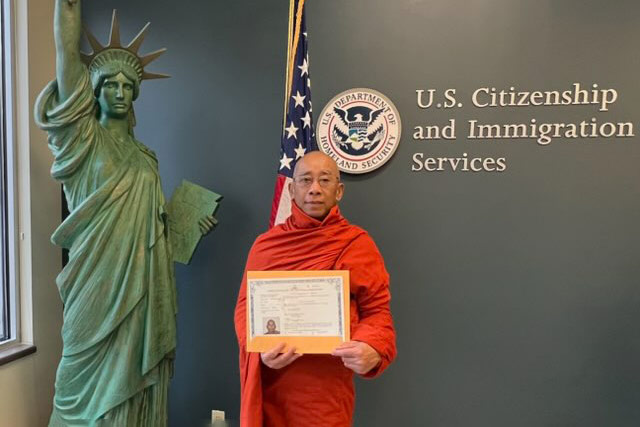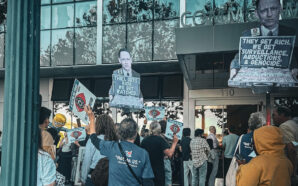
Ashin Pyinnyar Zawta (known as Nat Zaw), a 65-year-old Buddhist monk from the Metta Parami Monastery in Buffalo, New York. Photo Credit: SweSwe Aye / ACoM
SweSwe Aye
American Community Media
WASHINGTON, D.C. — The U.S. Department of Homeland Security (DHS) announced Nov. 24 the termination of Temporary Protected Status (TPS) for immigrants from Myanmar, a nation racked by an ongoing civil war and under harsh military rule.
Thousands of Myanmar nationals are impacted by the decision, with TPS protections scheduled to end January 26, 2026.
DHS Secretary of Homeland Security Kristi Noem stated in a press release that the termination was due to significantly improved conditions in Myanmar, making it safe for Myanmar nationals to return. The Secretary cited substantial positive developments, including: the lifting of the state of emergency, preparations for free and fair elections, successful ceasefire agreements, improved local governance, and efforts toward national reconciliation.
The decision by Secretary Noem was based on a review of the situation in Myanmar conducted by U.S. Citizenship and Immigration Services, in consultation with the Department of State.
Community Leaders Condemn DHS Decision
The decision was met with immediate criticism from the Burmese community in the U.S.
“I see the assessments as completely erroneous,” said Nay Tin Myint, a former political prisoner and leader of the New York City Burmese Community. “The arrest of Ashin Pyinnyar Zawta, an American citizen monk who returned to Myanmar from Buffalo, New York, in November 2024, is proof that the country is not safe for return.”
Nay Tin Myint also mentioned recent political action here in the US: “About 500 Myanmar residents residing on the East Coast just protested in front of the White House and the Embassy of the People’s Republic of China on November 23, calling the December 28 election planned by Myanmar’s military council (SAC) a sham that lacks the consent of the people of Myanmar.”
Political Prisoner Accounts Contradict Stability Claim
Following the February 1, 2021 coup that brought the current regime to power, the Tatmadaw (the Burmese military) assumed governance under a State of Emergency. This status, initially declared by Acting President Myint Swe, was extended seven times before expiring on July 31, 2025. Under the Constitution, this expiration legally mandates that elections be conducted within six months.
However, the military also imposed strict rules to control the electoral outcome:
- The military passed a new electoral law in January 2023. This law effectively barred key opposition leaders like Aung San Suu Kyi and Win Myint from participation, stiffened requirements for party registration, and shifted the upper house (Amyotha Hluttaw) voting system from first-past-the-post to a proportional system.
- Simultaneously, the junta banned dozens of political parties and has jailed an estimated 30,000 political prisoners.
The plight of American citizens returning to Myanmar
On November 5, 2024, Ashin Pyinnyar Zawta (known as Nat Zaw), a 65-year-old Buddhist monk from the Metta Parami Monastery in Buffalo, New York, returned to Myanmar on a religious visa to attend a ceremony. On November 13, he was arrested by the military regime near the North Okkalapa roundabout in Yangon after the taxi he was riding in was intentionally hit by another car.
He was charged under multiple laws, including Penal Code Section 505(a) for incitement against the government (which carries a maximum of two years in prison), and Sections 13(1), 52(a), and 50(j) related to immigration, supporting, and making contact with anti-government resistance groups. The monk was sentenced to 15 years in prison.
Ashin Pyinnyar Zawta recounted the ordeal: “The Los Angeles Consulate General Office issued me a religious visa. I returned only for the Kathina ceremony, not for any political work. Yet, they arrested me without any strong evidence and gave me 15 years.”
During his detention, the monk was defrocked and forced to wear civilian clothes. He endured eight days of brutal interrogation at the notorious Yay Kyi Ai center in Mingaladon Township and five days at the Htauk Kyant police station. “When they interrogated me at Yay Kyi Ai about political activities, I faced physical abuse—they punched me, kicked me, and physically beat me,” he said.
U.S. Embassy officials contacted him while he was imprisoned at Insein Prison. He was released on October 30, 2025, and returned to the United States using an emergency passport, as his American passport, his cell phone and all his money were confiscated. “They announced my release on October 15, 2025, but I had to stay in prison longer because I didn’t have a passport,” he stated.
Ashin Pyinnyar Zawta, who was previously imprisoned in Myanmar from 1990–1993 and 1998–2004 for sedition, and again from 2008 for his role in the 2007 Saffron Revolution before moving to the U.S. in 2008, confirmed that Myanmar is still not safe or stable.
He noted that during his incarceration, a former Myanmar national from the UK and another from Germany, both traveling on business visas, were also arrested and remained in prison facing charges as of October 2025.
Risks to Asylum Seekers and Returnees
The U.S. government’s assessment—which cites ceasefires brokered by China, such as the one with the Myanmar National Democratic Alliance Army (MNDAA) in January 2025 and ongoing talks with the Ta’ang National Liberation Army (TNLA) and effective local ethnic administrations as proof of stability—is disputed by community leaders. While 10 ethnic armed groups have signed the Nationwide Ceasefire Agreement (NCA), many others, including the United Wa State Army (UWSA) and the Kachin Independence Army (KIA), have not. Moreover, the Arakan Army (AA) and the National Unity Government’s (NUG) People’s Defense Forces (PDFs) remain actively engaged in conflict.
Kyaw Htay Oo, a former political prisoner and an American citizen, residing in Los Angeles, who was detained in 2021 for contacting the Myanmar Permanent Representative to the UN in New York, warned against relying on China’s role. “China has never wanted the ethnic armed groups and the Myanmar military to find genuine peace. China has always supported one side or the other to sustain the conflict,” he said.
Kyaw Htay Oo, who was released in November 2022 after intervention by former New Mexico Governor Bill Richardson, detailed the human rights abuses he suffered in custody, including being kicked and punched by three officers, which fractured four upper teeth and his pelvis, and caused long-term arm pain. He also received electric shocks and suffered from E. coli bacteria due to unsanitary prison water.
“The prisons and interrogation centers in Myanmar are truly hell on earth. Political prisoners have zero human rights, not even the rights of an animal,” said Nay Tin Myint, who was imprisoned from 1989–1993 and 1993–2005.
The community is highly concerned about the fate of those who must now return. Kyaw Htay Oo stated, “I not only sympathize but am extremely worried for the people who will have to return to Myanmar because they are losing their legal status in the U.S.”
Another American citizen woman, Thet Ko Ko (aged 45), who owns a Facebook account under the name Shwe Thet and lives in Jacksonville, Florida, was arrested on October 13, 2025, in Pyin Oo Lwin for “inciting instability and spreading propaganda on social media.” She remains in detention.
Nay Tin Myint expressed profound concern. “The arrest of an American citizen like Ma Thet Ko Ko, even with the TPS terminated, makes me extremely worried for the young people who will be sent back. Forcing the new generation of Myanmar back under the military council’s rule is equivalent to destroying them.”
Congressional Hearing Spotlights Deterioration of Burma’s Crisis
On November 19, 2025, the U.S. Congress held a hearing titled “No Exit Strategy: Burma’s Endless Crisis and America’s Limited Options.“
During the session, lawmakers urged the U.S. to take stronger action to confront Myanmar’s unending crisis, warning that the country is headed toward becoming a “failed state” as the military junta tightens its grip and prepares for a widely denounced “sham” election. At the hearing, Lucky Karim, a Rohingya refugee who fled the military crackdown at age 14, testified that conditions in Myanmar have only deteriorated since the 2021 coup. She reported that the Rohingya remaining in Rakhine State are “dying from hunger” and are cut off from humanitarian aid, with violence continuing to push tens of thousands into camps in Bangladesh.
The TPS program for Myanmar was initiated on May 12, 2021, following the coup. As of November 24, 2025, there were 3,969 Myanmar nationals residing in the U.S. under TPS status. However, many tens of thousands of Burmese, who often entered on student or tourist visas, have also filed for political asylum.
A 24-year-old Myanmar woman in Los Angeles, who requested anonymity, noted, “I came to the U.S. on a student visa in 2022. I applied for TPS, but because it is temporary, I also filed for asylum. Even though TPS is ending, my Asylum Pending status remains.”
Gyi Soe, a Burmese community leader and a writer, underscored that the U.S. review emphasizing the military’s upcoming election and the claim of stability is worrying for asylum applicants.
SweSwe Aye is a reporter with the Myanmar Gazette where this story was first published.
Photo Caption 1:
Photo Caption 2: Nay Tin Myint, a former political prisoner and leader of the New York City Burmese Community. Photo Credit: SweSwe Aye / ACoM





